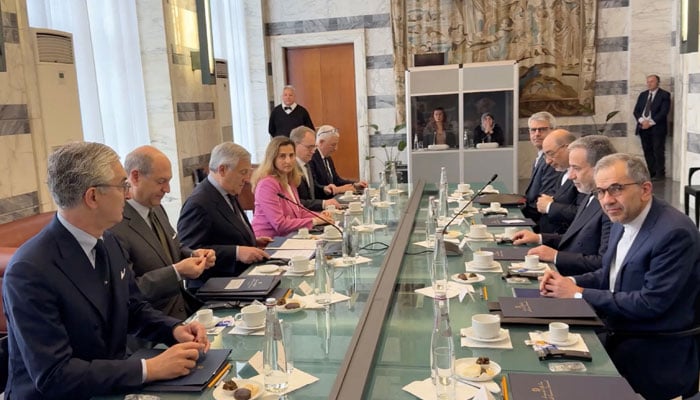
- Expert meetings will begin on Wednesday in Oman.
- High negotiators to meet again in Oman next week.
- After the conversation, no comment was made immediately by the US.
Dubai: Iran and the United States agreed on experts working to develop a framework for a possible nuclear deal on Saturday, the Iranian Foreign Minister said after President Donald Trump’s second round of talks with military action.
In his second indirect meeting in a week, Foreign Minister Abbas Iraqi talked to Trump’s Middle East envoy Steve Watkov in Rome for about four hours with a general official who stopped messages between him.
Trump, who abandoned the 2015 nuclear deal between Tehran and world powers during his first term in 2018, threatened to invade Iran until he quickly reached a new deal that could prevent him from developing a nuclear weapon.
Iran, which says its nuclear program is peaceful, says it is ready to discuss limited sanctions on its nuclear work in exchange for lifting international sanctions.
Addressing the State TV after the talks, the Iraqi was useful and organized in a constructive environment.
“We managed to make some progress on many principles and goals, and eventually reached a better understanding,” he said.
“It was agreed that the talks would continue and go to the next phase, in which the expert level meetings would begin in Oman on Wednesday. Experts will have the opportunity to start a framework design for an agreement.”
“To review the work of the experts and to assess the work that they will meet again in Oman next week, they will estimate how closely it is associated with the principles of a potential contract,” he added.
Last week, echoing cautious comments by Supreme Leader Ali Khaamini, adding: “We cannot say that we are hopeful. We are working very cautiously. Either there is no reason for excessive disappointment.”
After the conversation, the US did not immediately comment. Trump told reporters on Friday: “I am very easy to stop Iran from having nuclear weapons. They can’t have nuclear weapons. I want Iran to be great and prosperous.”
According to Israeli officials and two others familiar with the matter, Washington’s ally, Israel, who opposed the 2015 deal with Iran in 2018, did not deny Iran’s attack on Iran’s nuclear facilities in the coming months.
Since 2019, Iran has violated it and has surpassed the boundaries of the 2015 deal on enrichment of its uranium, and more stocks have been produced, which the West says is essential for a civilian energy program.
On Friday, a senior Iranian official, who on Friday, described the Iranian negotiation position on the condition of anonymity, lodged his red lines as he never agreed to abolish its uranium enrichment, reducing the 2015 renovation or lowering its reserves.


